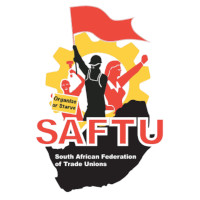South African Federation of Trade Unions – SAFTU
SAFTU IS OPPOSED TO THE INTEREST RATE HIKE BY 75 BASIS POINT
Upon increasing the US interest rates by 75 basis points, Chair of Federal Reserve Jerome Powell said that “he wished there were a painless way to” fight inflation. But, according to him, “There isn’t.”
Tailing the Federal Reserve, the South African Reserve Bank (SARB)’s Monetary Policy Committee (MPC) has opted for the painful way by hiking the interest rate by 75 basis point. This interest rate hike takes the repo (repurchase) rate for lending between the SARB and commercial banks to 6,25%, whilst the prime rate (the base rate for the consumers from commercial banks) rose to 9,75%.
Demand or Supply or Profit Induced
Previously, we have recorded our opposition to using interest rates as tools for targeting inflation. It is regressive and sabotages the economy further in the context of low growth.
For us, the idling human and industrial capacity in the country is a testament that different measures other than interest rates can be used to fight inflation. This inflation is not stoked by demand, but by low growth in production. In fact, to solve demand pull inflation, an economy based on creating the social wellbeing for society as whole, would strive to raise the production capacity to beat inflationary pressures caused by aggregate demand.
However, aggregate demand has not risen substantially to have inflationary pressures. If anything, the consumption statistics published in the GDP statistics for quarter 2 shows that expenditure in many areas declined, whilst they increased substantially in other areas. This is mainly induced by high prices which made households to prioritise their expenditure.
But the economic growth declined in the second quarter, reflecting not just slow growth trajectory, but also pushing industrial and human resources into idle. This is caused by lack of investment in the country due to the investment strike of the corporate sector and the neoliberal policy measures that have pushed government to slash its investments in general service provision and its state corporations.
The investment strike has resulted in the hoarding of an estimated R1,4 trillion is not without course. It is premised on profiteering motives. Having lobbied the South Africa’s monetary authorities at the Reserve Bank to continually adopt an inflation target of between 3 – 6%, which can only be achieved by using the blunt instrument of interest rates, the tycoons will leave even more of their money in the banks and still make a profit of 5%.
In addition to this, those who are involved in currency trading in the foreign exchange market — the currency traders who profit from the buying and selling of money itself — are also having a grip on the monetary policy direction of the Reserve Bank. The currency traders who profit from interests on money stock, dump currencies that have low interest rates for those that have higher interest rates as this determines their level of profiteering. This explains why Lesetja Kganyago and the MPC tails the Feds in the USA.
The investment strike and the currency traders demonstrate how our monetary policy serves the interests of profiteering more than anything. This means when Kganyago said he is defending the buying power of the workers’ wages, he was in real terms incentivising currency traders to not dumb the Rand. Simultaneously, he was increasing profits for the corporate elite in the financial sector who profit merely by packing their money in banks and financial assets.
Impact on households and small businesses
Reflecting the four successive increases in interest rates since November 2021, consumption of housing dropped significantly in the second quarter of 2022. This reflects the high costs of mortgage and home loans. Other goods such as clothing which have increasingly been financialised, in which more and more households buy clothes on credit, also declined in the second quarter of 2022.
Contrary to Governor Kganyago’s utterances, he is eating directly into the purchasing power of the wages of ordinary workers by hiking interest rates. Those workers who hold financial liabilities such as home loans, mortgage, credit facilities, car loans and other forms of loans will see the cost of their debt increasing and clawing more on their wages and salaries.
First National Bank (FNB) revealed that 80% of the income of the middle-income earners — doctors, lawyers, and professional public servants, etc. — is depleted within 5 days. In addition, 65% of such income is spent on credit.
Even worse, he is pushing most of these workers out of work since small and medium enterprises will retrench workers when they go out of business due to defaults on their loan and credit facilities. But this is what Chairman Powell means by painful way of fighting inflation, which Governor Kganyago happens to agree with. Their intention is to choke small businesses with high interest rates, bankrupt them and get workers retrenched and thereby reduce the money in circulation in the hope that it lower aggregate demand. Put differently, the working class are a sacrificial lamb for the resuscitation of capitalism.
This is the reason why SAFTU campaigns for capitalism to be replaced with socialism — a system based on the production for the satisfaction of human need, and not profit.






